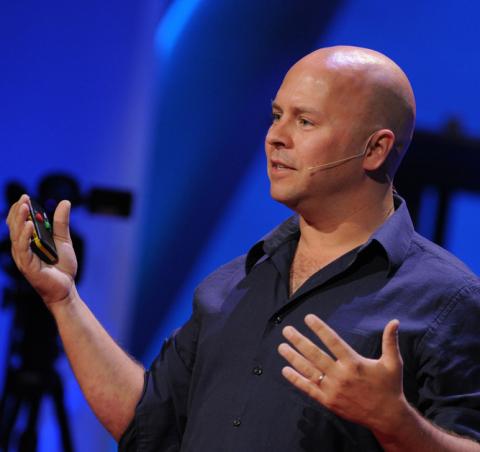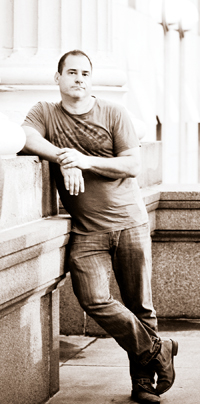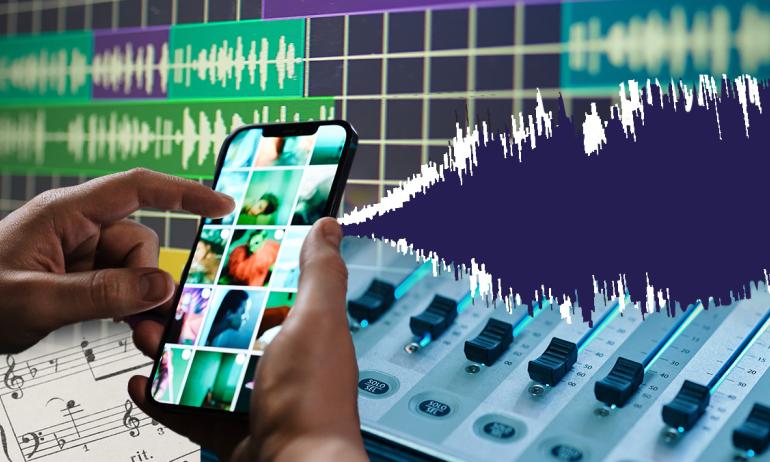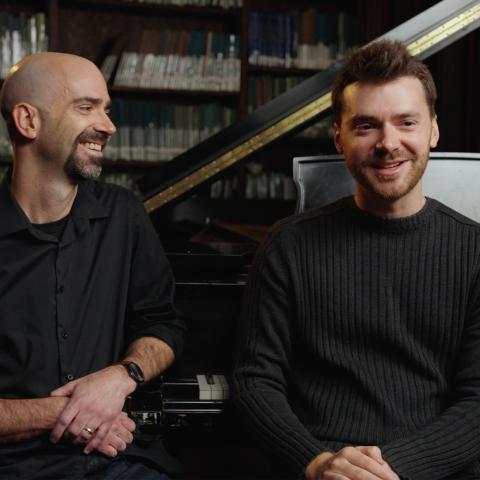Musicians Are Natural Entrepreneurs

Making music and running an entrepreneurial career are dual roles now required of today’s artists. Wearing both hats successfully is a challenge. But, as CD Baby founder Derek Sivers notes, “The skills needed to make a living as a musician are the exact same skills required to be a successful entrepreneur.” According to Sivers, “Musicians don’t realize that they are already entrepreneurs!”
Entrepreneurs like Sivers have created services that address the massive changes in the industry and help fellow artists balance the creative and business sides of their careers. These entrepreneurs are uniquely qualified. They understand their customers because they are their customers. They are motivated by generosity and a desire to empower other musicians. Their experience as musicians gives them a natural entrepreneurial skill set.
Only Three Chords (Plus a Few More)
In its essence, business is the process of creating and sharing value. To do so successfully, whether creating an album; building a software platform; performing, teaching, composing, or opening a restaurant, one must answer some basic questions:
- Who are your customers? Where do they hang out? How do they want to engage with you?
- How does your business create value? What need does your product or service meet? What problem are you solving?
- How will you take in more money than you spend?
- How will you address competition and future disruption? What makes you unique and how will you continue to innovate?
- How will you build and manage a team to realize your vision?
- How will people find out about you, become your fans, and stay connected?
This article looks at four companies founded by Berklee alumni, including CD Baby, the gold standard of online music sales and distribution for independent musicians; PledgeMusic, a direct-to-fan platform using fan funding to deepen the artist-fan relationship; Nimbit, a one-stop, fan engagement platform acquired by PreSonus Audio Electronics in 2012; and Sonicbids, a live promotion and booking platform that has grown to include brand marketing and music placement services, which Backstage recently purchased. In each case, the founders answered the questions above by creating tools that help musicians find those same answers in their careers.
The Accidental Business
You simply cannot solve a problem if you do not deeply understand the problem you’re solving, and you cannot design a solution if you do not deeply understand those that will use it.
—The Lean Entrepreneur, Brant Cooper and Patrick Vlaskovits
In 1997, many years before PayPal and the online commerce platforms emerged, Derek Sivers ’91—who at the time was a successful songwriter and bandleader—wanted to sell his CDs online. Since no off-the-shelf solutions existed, he set up a merchant bank account, taught himself computer programming, and built his own shopping cart to process credit cards. When other musicians saw his work, they asked if he could put their CDs online as well. “I realized I had accidentally started a business.” Sivers says in his 2011 book Anything You Want: 40 Lessons for a New Kind of Entrepreneur. “But I didn’t want to start a business. I was already living my dream as a full-time musician. I didn’t want anything to distract me from that. So, I thought that by taking an unrealistically utopian approach I could keep the business from growing too much.”
Sivers built CD Baby on a simple set of principles based on his preferences:
- Musicians would be paid every week.
- The system would collect the full name and address of everyone who purchased music (unless customers opted out).
- No artist would be removed from the system for not selling enough.
- CD Baby would not accept money for preferential placement on the site.
CD Baby quickly became a trusted partner for musicians. By putting them first, Sivers built a loyal, passionate customer base. Soon the company was home to the largest online community of independent recording artists.
Sivers grew his business with a personal touch. Musicians still talk about the amusing e-mail messages they receive when their music sells on the site. In 2004, after being approached by Steve Jobs, CD Baby became a digital music distributor. Sivers sold the company to Disc Makers in 2008 for $22 million, and placed his interest in a trust for music education—not bad for a business started by accident.
These days, Sivers is “in the shed, head down, and programming a bunch of new services that I hope are useful to musicians, and normal people too.” His advice for musicians managing their careers: “Forget everything and remember that it’s just real people. There’s no such thing as a crowd. It’s just individuals. Talk to them. Treat them as unique individuals. Treat them as your friend, not your customer. Find out what they want and like. Speak with them exactly like you speak with your best friend. There should be no difference.”
On creating value, Sivers says, “Follow the money. Do what pays you! We put a lot of cultural baggage on money. But really, it’s quite a neutral indicator that you’re adding value to people’s lives. Go for the paying gigs. Aim to make money from the things you create. By constantly focusing on this, you’re focusing on being valuable.
“The definition of the starving artist is someone who’s creating things that are very valuable to him, but not valuable to others. Focus on being valuable to others and on making money with music.”
Winning organizations are fast, agile, and tenacious.
They are focused on what moves the needle.
—The Lean Entrepreneur
The Complete Solution
No business plan survives first contact with customers.
—The Startup Owner’s Manual, Steve Blank

“Rather than do this as a boutique business for the big guys,” Faucher says, “I wanted to make a platform for everybody. I wanted a place where you could build your website, have a fan mailing list, do all the stuff you needed to do. That was the idea behind Nimbit back then, and it still is to a large extent today.”
A mile down the road from Faucher’s house, Phil Antoniades ’88 a drummer and serial entrepreneur, was growing his own company, Artist Development Associates, which provided fulfillment and management services to touring bands and musicians. In 2004 the two companies merged and became the Nimbit of today. As they have gained a deeper understanding of artists’ real needs, the company has iterated its platform many times and is currently rebuilding from the ground up.
Nimbit offers artists a flexible, transportable storefront designed for creating unique, personalized experiences for the artist’s audience. This could include selling music, promoting shows, crowd funding, and special fan packages. The platform is designed with the flexibility to manage these campaigns on an ongoing basis.
“I worked with singer/songwriters in the ’90s and discovered that there was this world under the radar,” Antoniades says. “I learned that if you know your fans and you work with them, you can make a real business out of it. Most people have X amount of time devoted to furthering their career. They need to know what to do, how to do it efficiently, and what the results are. I’m a believer in the complete solution. We are working on turning Nimbit from a set of direct-to-fan tools into something that motivates an artist and keeps them engaged. We ask our artists to engage their fans, and we have to engage our artists.”
Responding to customers’ needs, Nimbit developed a powerful promotional tool that integrates seamlessly into customers’ platforms. “It’s amazing how giving away a free track and following it up with an offer for something else will get a response as opposed to giving away a free track and just watching it go into the ether,” Antoniades says. “So we built a tool that automatically follows up with a promo. Whenever you promote something, it has this extra follow-up that gives that subset of fans—which is pretty large—another level on which to engage. A lot of artists think, ‘That’s asking for money. That’s begging.’ But it’s really not. The psychology is that you’re engaging your fan. Music is still one of the very few things that your customer gets an emotional attachment to, and that’s valuable!”
As with CD Baby, Nimbit artists retain information about its customers. “When you put your music on iTunes,” Antoniades says, “you never know who bought your stuff. You get no relationship. Artists need that contact information. They need to know the buying habits of their fans.”
“Artists generally fall into two camps,” Faucher says. “Some are into it for the art and want success, but see the artistic and the entrepreneurial processes as incompatible. They want to get with a label and have them deal with all of that. The other camp, generally younger, understands how the entrepreneurial and artistic processes serve each other. You make your art. You don’t tailor it to your market, tailor your business model to where that market lies—these are your fans. You aren’t going to hand those relationships over to a label or a retailer. This second group of artists has a much better chance for sustainable careers. We are looking to support that model with our platform.
“The majority of label deals today are partnerships, which is how it should be. Now artists have some bargaining power, especially if they show up with a complete market already in tow and they own the customer list. I think the next generation of artists will understand that on an intrinsic level. The most successful artists [have always been] equal amounts artist and entrepreneur: Ray Charles, Madonna, Prince, Lady Gaga—they’re moguls.”
In 2012 Nimbit was acquired by PreSonus in what both principals say is a fantastic partnership. The first thing PreSonus did was build a connection between Nimbit and PreSonus’s Digital Audio Workstation. Among other things, this enables artists recording a live show to immediately make tracks available to their fans.
Pledging Allegiance to the Fan
If you don’t have a deep understanding of the pain or passion of your target customer, you have no business talking about your solution.
—The Lean Entrepreneur

Benji Rogers ’92
PledgeMusic provides artists with the tools to understand and connect with their early-adopter, superfans, bringing them into the experience of creating a full music campaign from preproduction to commercial release.
“What fans really want to experience in a world of on-demand access is being a part of the music as it is being made,” Rogers says. “The focus is not on the transaction, but the experience, and making sure that the value proposition put in front of the fan is something they will respond to,” Varden adds. In a recent study, the Nielsen Company estimated that $.5 to $2.6 billion is left on the table every year in the U.S. music industry because fans are not offered that musical experience. “Fans know where to get the products,” Rogers says. “They want the experience. That’s what’s missing.”
Artists keep fans in the loop by producing transmedia updates that can be made available to the general public or only to pledgers. Pledgers receive special packages and artist access for their participation in the presale campaign.
PledgeMusic campaigns don’t end when they reach the 100 percent level. Often they exceed their initial goals. “We estimate that after 60 days of a campaign going live, an artist will make 37 percent of their income,” Rogers says. “So why close it and make it just about a funding period?”
One of the unique aspects of PledgeMusic is its focus on social marketing. While not a requirement, artists are encouraged to give a percentage of the money they raise to the charity of their choice. “About 98 percent of the artists add a charity,” Varden reports. “It’s very personal. It’s not something we dictate, but something we certainly encourage. It’s an amazing thing to be able to pay it forward that way.”

Pledge works with major artists and record labels too. “The music industry has always been about risk,” Rogers continues. “We do pre-sales—often months before the album is recorded or mixed. You de-risk that investment for someone who wants to come in on the back end and release it. All the data collected by the artist is owned by the artist or the label. We work as hard for an artist starting out as we do for a big artist, because each is important to us as musicians. We’ll help you get everything you need done. It’s not over until it’s funded.”
“I feel that what we do is meld the best parts of the crowd-funding industry with the best parts of the direct-to-fan proposition,” Varden says. “Ultimately, that benefits the artist, fan, and charity.”
Seeing around the Next Curve
Founding entrepreneurs are out to make their vision and business real. To succeed, they must abandon the status quo, recruit a team that shares their vision, and strike out together on what appears to be a new path, often shrouded in uncertainty, fear, and doubt.
—The Startup Owner’s Manual

Inspired by a magazine ad for Berklee he’d seen that featured John Scofield, he decided to head for Boston. At Berklee Panos became fascinated with Don Gorder’s brand-new music business program. He changed his major and graduated with Berklee’s first music business students. “I developed lifelong habits, like reading the Wall Street Journal and The Economist,” Panay says. “I realized that when you do business, you’re not independent of the environment in which you operate. To me, there is really no such thing as ‘the music business.’ It’s business applied to the field of music, but it’s still a business that operates in a broader socioeconomic environment. The Berklee courses piqued my curiosity and have been instrumental in the way I’ve approached business over the years.”
As part of his music business program, Panos did an internship at Ted Kurland Associates, an international booking agency. He worked his way to a six-figure salary booking the artists he grew up admiring: Pat Metheny, Chick Corea, Isaac Hayes, Sonny Rollins, and others.
When Panay received press kits from artists that were not big enough box-office draws to merit attention from the Kurland agency, the seeds for Sonicbids were planted. He saw the potential of the Internet to provide a platform that could serve all artists. In September 2000, he quit his job to work on Sonicbids full time.
Over the past 13 years, Sonicbids has become the premier online booking platform for independent musicians and has expanded to include music licensing and brand-marketing services. Just as eBay brings together buyers and sellers, Sonicbids connects musicians, promoters, and brand managers.
In January 2013, Sonicbids was acquired by Backstage, an established company offering services to actors similar to what Sonicbids provides to musicians. With a common shared mission of helping those working in the performing arts connect with job opportunities, the deal makes perfect sense. Panay led his company from the startup phase through a major acquisition.

Natural Entrepreneurs
“After touring on the road with a band, it very easy to be in a startup,” Nimbits’ Antoniades says. “It’s the same mentality. There are some amazing business people who can’t improvise to save their lives. But as a musician, you look at the world in a completely different way. You want me to get in front of 100 people and talk about this business? No problem. You want me to start talking about something I know nothing about? No problem. Improvising! That’s what it is.”
“Everything you’re learning by being a full-time musician is teaching you everything you need to know to run a company—if you want to,” Sivers says. “Musicians learn to find good players that they get along with, manage delicate egos, and keep the team focused and moving forward. This is no different than hiring. Musicians learn to put together a good show that’s entertaining, draws a crowd, and grows by word-of-mouth. That’s basically product development. Musicians have to hustle, network, look everywhere for opportunities, and say yes first and figure it out afterward. That’s business development. Musicians know how to describe their music in an enticing way, present an intriguing image, and win fans wherever they go. That’s marketing.
“Read business books and apply them to your music career,” Sivers continues. “They may use examples about carpet cleaners or shipping companies, but with a little metaphorical thinking and imagination, you can apply the principles to your situation in music. By doing that, you’ve just put yourself ahead of the 99 percent who don’t. Then if you want to make a company, you’ll find you’ve already learned what you need.”
Staying the Course . . .
“When artists say these things are too hard or sound complicated,” PledgeMusic’s Rogers says, “I can tell them that I’ve done what they’re trying to do. I’m the guy who gets on stage with a guitar and asks people to sign an e-mail list, and I e-mail them that night. If I can do it, so can you. My voice professor at Berklee, Charlie Sorrento, was such an inspiration. He always told me that even if you think you’re not going to hit the note, just tell yourself that you will. Know that you’ll do it, and you’ll pull it off. When we were starting PledgeMusic, people were telling me, ‘You can’t do this, it doesn’t work that way.’ I had Charlie’s words ringing in my ears: ‘You’ll do it, you’ll find a way.’”




